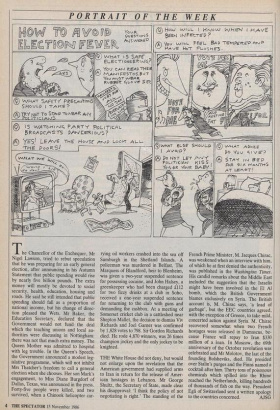PORTRAIT OF THE WEEK
The Chancellor of the Exchequer, Mr Nigel Lawson, tried to rebut speculation that he was preparing for an early general election, after announcing in his Autumn Statement that public spending would rise by nearly five billion pounds. The extra money will mostly be devoted to social security, health, education, housing and roads. He said he still intended that public spending should fall as a proportion of national income, but his change of direc- tion pleased the Wets. Mr Baker, the Education Secretary, declared that the Government would not fund the deal which the teaching unions and local au- thorities were discussing in Nottingham: there was not that much extra money. The Queen Mother was admitted to hospital with leg trouble. In the Queen's Speech, the Government announced a modest leg- islative programme, which will not inhibit Mrs Thatcher's freedom to call a general election when she chooses. Her son Mark's engagement, to Miss Diane Burgdorf of Dallas, Texas, was announced in the press. Forty-five people were killed, and two survived, when a Chinook helicopter car-
rying oil workers crashed into the sea off Sumburgh in the Shetland Islands. A policeman was murdered in Belfast, The Marquess of Blandford, heir to Blenheim, was given a two-year suspended sentence for possessing cocaine, and John Halsey, a greenkeeper who had been charged £112 for two fizzy drinks at a club in Soho, received a one-year suspended sentence for returning to the club with guns and demanding the cashbox. At a meeting of Somerset cricket club in a cattleshed near Shepton Mallet, the decision to dismiss Viv Richards and Joel Garner was confirmed by 1,828 votes to 798. Sir Gordon Richards died. He rode 4,870 winners, was 26 times champion jockey and the only jockey to be knighted.
THE White House did not deny, but would not enlarge upon the revelation that the Americah government had supplied arms to Iran in return for the release of Amer- ican hostages in Lebanon. Mr George Shultz, the Secretary of State, made clear his disapproval: 'I think the policy of not negotiating is right.' The standing of the
French Prime Minister, M. Jacques Chirac, was weakened when an interview with him, of which he at first denied the authenticity, was published in the Washington Times. His candid remarks about the Middle East included the suggestion that the Israelis might have been involved in the El Al bomb, which the British Government blames exclusively on Syria. The British account is, M. Chirac says, 'a load of garbage', but the EEC countries agreed, with the exception of Greece, to take mild, concerted action against Syria. M. Chirac recovered somewhat when two French hostages were released in Damascus, be- cause France will repay to Iran $330 million of a loan. In Moscow, the 69th anniversary of the October revolution was celebrated and Mr Molotov, the last of the founding Bolsheviks, died. He presided over Stalin's purges and the Finns named a cocktail after him, Thirty tons of poisonous chemicals which spilled into the Rhine reached the Netherlands, killing hundreds of thousands of fish on the way. President Egli of Switzerland sent a written apology
to the countries concerned. AJSG


































































 Previous page
Previous page